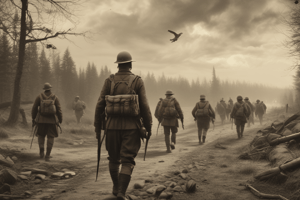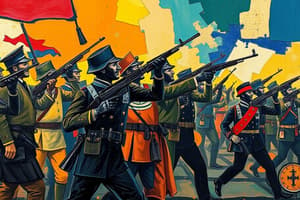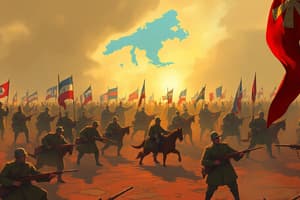Podcast
Questions and Answers
What technology was first used in mass at the Battle of the Somme in 1916?
What technology was first used in mass at the Battle of the Somme in 1916?
- Trench warfare
- Tanks (correct)
- Submarines
- Airplanes
Which impact of World War I led to significant economic disruption, hyperinflation, and a rise in national debt?
Which impact of World War I led to significant economic disruption, hyperinflation, and a rise in national debt?
- Social impacts
- Economic impacts (correct)
- Cultural impacts
- Geopolitical impacts
Which consequences of World War I inspired the suffragette movement demanding the right to vote for women?
Which consequences of World War I inspired the suffragette movement demanding the right to vote for women?
- Treaty of Versailles
- Social impacts (correct)
- Economic impacts
- Geopolitical impacts
What type of weapons, used by both sides, were examples of chemical weapons in World War I?
What type of weapons, used by both sides, were examples of chemical weapons in World War I?
Which artistic expressions were inspired by World War I, including poetry, prose, and visual arts?
Which artistic expressions were inspired by World War I, including poetry, prose, and visual arts?
What does the Treaty of Versailles, which ended World War I, symbolize?
What does the Treaty of Versailles, which ended World War I, symbolize?
What was the key event that accelerated the start of World War I?
What was the key event that accelerated the start of World War I?
Which countries formed the Central Powers during World War I?
Which countries formed the Central Powers during World War I?
Where did trench warfare predominantly occur during World War I?
Where did trench warfare predominantly occur during World War I?
Which event marked the end of the Austro-Prussian War in Europe?
Which event marked the end of the Austro-Prussian War in Europe?
Which campaign involved a joint effort against the Ottoman Empire in Turkey during World War I?
Which campaign involved a joint effort against the Ottoman Empire in Turkey during World War I?
Which countries were part of the Allied Powers during World War I?
Which countries were part of the Allied Powers during World War I?
Study Notes
Unraveling History: World War I
World War I, often referred to as the Great War or the First World War, was a global conflict that spanned four years, from 1914 to 1918. This monumental event reshaped the world order, influenced the course of history, and left indelible scars on the societies it touched. Let's delve into the key factors, events, and impacts of this pivotal period.
Causes and Triggering Events
The roots of World War I can be traced back to a combination of political, economic, and imperial tensions. Key events that accelerated the conflict include:
- The assassination of Archduke Franz Ferdinand of Austria-Hungary in Sarajevo on June 28, 1914, by a Serbian nationalist.
- The complex web of alliances: Central Powers (Germany, Austria-Hungary, and Turkey) versus the Allied Powers (Britain, France, Russia, United States, and Italy).
- Imperialism and the race for colonies.
- The balance of power in Europe following the end of the Austro-Prussian War in 1866 and the Franco-Prussian War in 1871.
Major Conflicts and Battles
World War I witnessed numerous battles and conflicts on multiple fronts, including:
- The Western Front: Trench warfare along the Western Front, with significant battles like Verdun, Somme, and Ypres.
- The Eastern Front: Conflicts between Germany and Russia, including the Battle of Tannenberg and the Brusilov Offensive.
- Gallipoli Campaign: A joint British, French, and Australian endeavor against the Ottoman Empire in Turkey.
- Battle of Jutland: A naval battle between the British and German navies.
The Role of Technology
World War I was marked by the use of new technologies, some of which would have a profound impact on future wars. These included:
- Trench warfare and machine guns, which led to a high number of casualties.
- Airplanes and submarines.
- Tanks, which were first used in mass at the Battle of the Somme in 1916.
- Chemical weapons, such as mustard gas and chlorine gas, which were used by both sides.
Impact on Society
The consequences of World War I reverberated through the world for decades to come.
- Economic impacts: The war led to significant economic disruption, including hyperinflation, a rise in national debt, and the formation of the League of Nations.
- Social impacts: The war gave rise to the suffragette movement, which demanded the right to vote for women in many Western countries.
- Cultural impacts: The war inspired an abundance of artistic expression, including poetry, prose, and visual arts.
- Geopolitical impacts: The Treaty of Versailles, which ended the war, redrew the map of Europe and set the stage for future conflicts.
Legacy and Memory
World War I left an indelible mark on global history and memory.
- Commemoration: Ceremonies and memorials, such as the Cenotaph in London and the Menin Gate in Ypres, honor the sacrifices of those who fought and died during the war.
- Literature and art: The war inspired an abundance of artistic expression, including poetry, prose, and visual arts.
- Historical analysis: Scholars and historians continue to analyze and study the myriad causes and consequences of World War I.
- Lessons and warnings: The war serves as a reminder of the devastating consequences of conflict and the importance of cooperation and peace.
World War I was a complex and multifaceted event that forever altered the course of history. As we remember and commemorate the sacrifices made by those who fought and died during the conflict, it is essential to learn from the lessons of the past to build a more peaceful and just future.
Studying That Suits You
Use AI to generate personalized quizzes and flashcards to suit your learning preferences.
Description
Test your knowledge on the causes, major conflicts, technological advancements, societal impacts, and legacy of World War I with this informative quiz. Explore key events such as the assassination of Archduke Franz Ferdinand, battles like Verdun and Gallipoli, technological innovations like tanks and chemical weapons, and the far-reaching consequences on societies and geopolitics.




